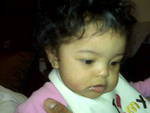
My daughter is black, and she’s Latina. She could call herself a black Latina. But she could also decide to be a Latina who is black. Sometimes she could be Mexican or Mexican-American And in her heart I hope a little piece of her grows up to be Chicano. Most of all, I hope somewhere, in all those designations, she understands she just simply is.
The 2010 Census has forced my husband and me to have another one of our long and multilayered discussions about what it means to be black and Latino in this country.
My husband is the son of two black parents, a dancer and a psychology professor, both of whom embraced the Black Power movement of the 1960s and ‘70s in New York City. I am the daughter of two Mexican immigrants, janitors who raised me in a traditional household in Texas, warning me to be weary of America’s materialistic culture and not to trust the promise of “fairness for all.”
Moving to Los Angeles, I discovered my Chicano pride. On those streets I found murals filled with sun-kissed people who looked like me, “lowriders” with their eponymous cars and Spanish-language music on every corner. There I experienced a political awareness of being not only Mexican-American but also “brown” in America. This same Chicano pride has inspired poets, artists, academics, musicians, student protesters, and many others to seek acknowledgement of a collective heritage of racially undefined “brownness” that comes with a subordinate status in this country.
And now here we are, the two of us married, with a six-month-old daughter who sometimes wakes up looking black and sometimes wakes up looking Mexican, and who always wakes up looking beautiful.
But how will the world see her, and how will she see herself? That remains to be worked out between her and society. We can only teach her what we know, who her people are, and where she comes from — two cultures full of music, good food, dancing, joy, hard work, powerful ancestors and lands that span from the Americas to Africa.
Our baby girl’s first name is Maya, for the Mayan people and the African American writer, Maya Angelou. Her middle name is Adeyemi, a Yoruba name from Nigeria that means “this crown suits me,” in honor of her grandmother.
And now this Census form attempts to box her into a few choice races. Impossible.
So we check a few boxes to try to have her counted where it matters for federal funds in America – “yes” for Hispanic origin, “Black” for race and “Mexican” as a write-in race we made up because we don’t find a race that fits her Latino half, and we refuse to label her “other.”
Meanwhile, we know it will take her a lifetime, as for most of us, to figure out how she counts herself.
- Follow us on Twitter: @inthefray
- Comment on stories or like us on Facebook
- Subscribe to our free email newsletter
- Send us your writing, photography, or artwork
- Republish our Creative Commons-licensed content

